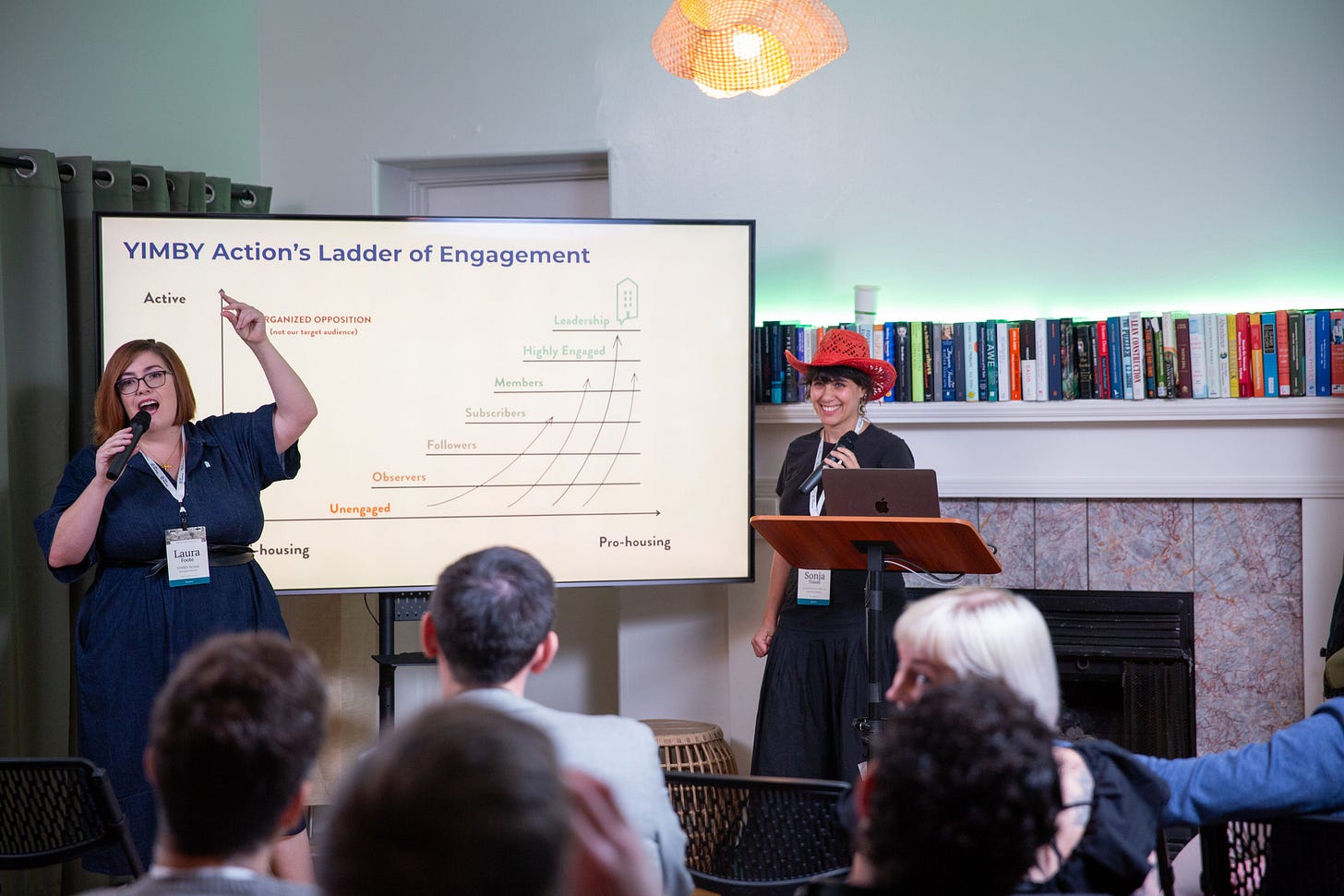Gavin Newsom Stole Your Trash Cans, An Abundance of Progress, and Urban Proxima is Going Live
Odds and Ends 24.11.2025
Hey folks, this one’s another roundup of various and sundry goings ons — should be something for everyone.
Notes on Notes
For those who don’t partake of the feed-based social media, reposting a note from October. It’s an honest to god true story on both levels (I actually did have this conversation on the streets of San Francisco and the Newsom Mayoral administration actually did remove a bunch of public trash cans) — enjoy.
Abundance Coke vs Progress Pepsi
Earlier this year I attended both the Abundance Conference in Washington D.C. as well the Progress Conference that was held a bit later in Berkeley. Both events were about charting a new course for society and making the world a better place, but there’s a lot between the two to compare and contrast.
For Abundance’s part, the conference was every inch a D.C. politico event (lots of think tankers, pundits, electeds, and policy advocates all gathered in a hotel conference space for two days). I myself was there in my capacity as YIMBY Action board chair.
The event was centered around the Ezra Klein/Derek Thompson book (Abundance) published earlier in the year and its attendant questions of “How can political progressives deliver materially meaningful improvements in people’s lives?” and “What do progressives need to change about the way they do politics to do so?”
Though folks were interested in a range of topics including AI and energy production, no conversation was ever more than ninety seconds away from housing given the centrality of the issue and all the tangible progress YIMBYs have made over the last several years. On the whole, the vibe was very anxious democratic party apparatchik.
The Progress Conference, in contrast, was much, much more west coast.1 Held at Lighthaven in Berkeley, the event had a less explicitly political tone. That’s not to say politics weren’t discussed — several prominent YIMBYs gave presentations on not only policy, but also politics — but the event was less focused on politics as the one and only vehicle for change. And given the makeup of the attendees, that’s not surprising. Where Abundance was quite beltway, Progress had a much larger share of entrepreneurs, engineers, and scientists. One of the most interesting talks I attended was a presentation by Renaissance Philanthropy CEO, Tom Kalil, on how to reimagine science funding to speed up research.
One of the other differences between the two events was the level of community. The organization that hosts the Progress Conference, the Roots of Progress Institute, does a good job fostering community and it’s a very intentional part of the programming before, during, and after the event. Part of their stated goal is to connect people in the hopes that those connections result in new research, new advocacy organizations, new companies, etc. They lean in hard on the idea that the people you meet at their conference might be people with whom you’ll want to go do something with out in the wider world.2

Fun stuff aside, the more Progress aligned folks are still grappling with how to think about theories of change. For the Abundance crowd, the answer is “figure out how to win at politics.” Given the folks in Berkeley were less squarely rooted in professional politics, it’s a more ambiguous question with less certain answers. On that topic, I was actually asked to write about how that conversation played out; so, click through if you want the commentary in long-form.
For me, everything is adjacent to (if not directly downstream of) something to do with urbanism.3 Usually that just means housing, but if we want to be precise, there’s a lot of messed up things in transit and municipal finance (Houston is far from perfect, after all). So, I’ll be interested to see how these conversations progress in the coming years and I’m hopeful that an abundance of technical talent, political energy, and financial capital all pushing in the direction of a positive sum world can do some good.4
Elsewhere Online — building housing, does it even matter?
In other news, I may have gotten into a spat with Australian Macroeconomist, Cameron Murray. For those who weren’t terminally online housing nerds in the heyday of Twitter (aka X-The Everything App), Dr. Murray is one of a handful of erudite academic commentators who believes that housing price has zero relationship with housing supply.
Though I was vaguely aware of Dr. Murray, my full introduction to his views came via a recent interview he did with The Boyd Institute. After listening to the conversation, I did my best to parse his arguments and respond in a full-on reaction post. As it turns out, the timing was fortuitous, as YIMBY Action Executive Director, Laura Foote, and I were scheduled to do a stream with the guys at Boyd the following week.
Inescapable Equilibrium?
Earlier this week, I listened to a podcast and proceeded to lose my mind. Or at least enter into whatever dissociative state the DSM says causes time skips and seemingly spontaneous production of response pieces.
Dr. Murray and I have gone back and forth a bit since then and, fwiw, I appreciate his willingness to engage. It’s been an exercise in active listening that’s given me an opportunity to re-interrogate my own policy positions. So, if you’re into that type of thing, there’s a few links here worth a listen and a read.
Onwards and Upwards
Speaking of live streams, we’re gonna try a few of those on Urban Proxima. After publishing interviews as transcripts in the past, I’m realizing that some conversations would be more entertaining and accessible in an audio-visual format. First on the list is a discussion with Andrew Miller, he’s the man behind one of the best transit newsletters on Substack, Changing Lanes, as well as co-author of the new book, The End of Driving: Automated Cars, Sharing vs Owning, and the Future of Mobility.
Tune in on Tuesday, December 2nd at 10am pst / 1pm est to learn all about the state of autonomous vehicles and what the technology will mean for infrastructure, policy, and the public. If you’re already a subscriber, I believe you’ll get a notification as soon as we go live; if not, you ought to be able to sign up here.
Couple closing thoughts for all of y’all who choose to spend your precious time and attention on the words I write.
First, thank you. There’s nothing more precious in this life than time, so the fact that any of y’all want to spend any of yours here with me is something I don’t take lightly. Second, I take requests. To me, this publication is less about content than it is conversation. To that end, my comments section, email, and DMs are always open. There are a thousand topics I’d like to cover, but if there are some that matter more to y’all, I am more than happy to pick up those questions first.
Fewer blazers.
The Roots of Progress Institute also runs a yearly writing fellowship, alumni of which are all invited to the conference. Yours truly was part of the second cohort and not only was it good for my writing, it also introduced me to several folks who have helped me become quite a bit smarter on a wide range of topics (and who I deeply enjoy as human beings).
Ex: energy abundance is as much a permitting issue as it it is a problem of technological or financial constraints.
Sorry, couldn’t help myself.




What are the politics and economics of public trash bins?